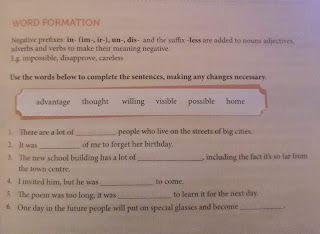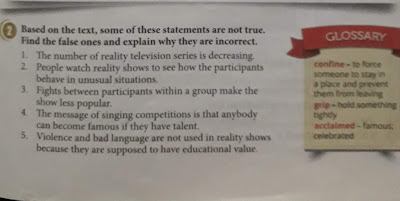G22
Key words - invisible = cannot be seen, inn = pub/tavern, to reveal = discover/disclose, former = ex, transparent = clear/see-through, to float = to hover, accomplice = collaborator, refuge =shelter/haven
2.
Uraditi vežbu pod nazivom Vocabulary na strani 104.
To podrazumeva da pronađete šest fraza i reči u tekstu koje su štampane crvenom bojom i da ih povežete sa objašnjenjima.

4. Prepisati spisak sa strane 106. Modalni odnosno krnji glagoli su praćeni krnjim infinitivom glagola i mogu izražavati :
5. Pročitati tekst The phenomenon of music na strani 113.
6. Reči numerous, remarkable, cautiously, bond, incredible , aid rasporediti na praznine iz vežbe Vocabulary 1 na strani 114.
7. Dopuniti praznine sa odgovarajućim oblicima datih reči : music, vary, distinction, tradition, prefer, questionably, deep, create. Pre toga definisati vrste reči , npr. music = noun / imenica, vary = verb /glagol .... Kada odredite vrste reči , možete pretpostaviti koji vam oblici reči nedostaju. Recimo primer broj 5 - prefer je glagol, znači da će na praznini biti potrebna imenica. Imajte u vidu da je negde potrebno dodati negativan prefiks.
8. U datim primerima ( tabela ispod ) pronaći nastavke tipične za prideve, npr. anger - angrY , guilt - guiltY , juice - juicY , luck - luckY ... Imate nastavke - ful , - ous , - able , -al , - ic , -ive ...
9. Pročitati tekst Festivals na strani 118 i prepisati reči .
2.
Uraditi vežbu pod nazivom Vocabulary na strani 104.
To podrazumeva da pronađete šest fraza i reči u tekstu koje su štampane crvenom bojom i da ih povežete sa objašnjenjima.
- by chance
- for a moment
- see- through, clear
- be discovered
- in the past, but not now
- make something known
Match the words with opposite meaning - Povezati reči suprotnog značenja.
- visible disadvantage
- reveal small / tiny
- advantage safe
- huge conceal / hide
- succeed invisible
- dangerous fail
3. Negativni prefiksi koji se pišu ispred prideva i menjaju im značenje

 Imajte u vidu da se negativni prefiksi IM - pišu ispred reči koje počinju sa M ili P, zatim IL - ispred reči koje počinju sa L i IR - ispred reči koje počinju sa R.
Imajte u vidu da se negativni prefiksi IM - pišu ispred reči koje počinju sa M ili P, zatim IL - ispred reči koje počinju sa L i IR - ispred reči koje počinju sa R.
Prepisati ove primere i uraditi vežbu sa strane 105.
4. Prepisati spisak sa strane 106. Modalni odnosno krnji glagoli su praćeni krnjim infinitivom glagola i mogu izražavati :
- obavezu / dužnost / moranje
- sposobnost / umeće
- dozvolu
- mogućnost / verovatnoću
- čvrsto uverenje
- savet itd.
Prepisati ključne reči.
Key words - numerous - many / various,
well - being - the state of being comfortable, healthy, or happy,
mood - particular feeling or state of mind,
cautious - careful / attentive,
duration - the time during which something continues,
aid - help, typically of a practical nature,
to bond - to join / to attach ,
peer - a person of the same age, status, or ability as another specified person .
Prevesti prideve iz vežbe Vocabulary 2 kojima se opisuje muzika .
7. Dopuniti praznine sa odgovarajućim oblicima datih reči : music, vary, distinction, tradition, prefer, questionably, deep, create. Pre toga definisati vrste reči , npr. music = noun / imenica, vary = verb /glagol .... Kada odredite vrste reči , možete pretpostaviti koji vam oblici reči nedostaju. Recimo primer broj 5 - prefer je glagol, znači da će na praznini biti potrebna imenica. Imajte u vidu da je negde potrebno dodati negativan prefiks.
8. U datim primerima ( tabela ispod ) pronaći nastavke tipične za prideve, npr. anger - angrY , guilt - guiltY , juice - juicY , luck - luckY ... Imate nastavke - ful , - ous , - able , -al , - ic , -ive ...
Some adjectives can be identified by their endings. Typical adjective endings include:
- -able/-ible understandable, capable, readable, incredible
- -al mathematical, functional, influential, chemical
- -ful beautiful, bashful, helpful, harmful
- -ic artistic, manic, rustic, terrific
- -ive submissive, intuitive, inventive, attractive
- -less sleeveless, hopeless, groundless, restless
- -ous gorgeous, dangerous, adventurous, fabulous
Sometimes when adding these endings changes have to be made. Here are some rules for forming adjectives and their exceptions:
| Add | Exceptions | Word | Adjective |
| -al | If ending with an ‘e‘, drop it | Nature Function | Natural Functional |
| -y | If ending with an ‘e‘, drop it | Ice Oil | Icy Oily |
| -ful | If ending with a ‘y‘, replace with an ‘i‘ | Beauty Peace | Beautiful Peaceful |
| -ous/-ious | If ending with a ‘y‘, drop it | Mystery Danger | Mysterious Dangerous |
| -ic | If ending with a ‘y‘, drop it | History Rust | Historic Rustic |
| Noun | Adjective |
|---|---|
| Anger | Angry |
| Beauty | Beautiful |
| Craziness | Crazy |
| Danger | Dangerous |
| Ease | Easy |
| Familiarity | Familiar |
| Guilt | Guilty |
| Happiness | Happy |
| Intelligence | Intelligent |
| Juice | Juicy |
| Kindness | Kind |
| Luck | Lucky |
| Misery | Miserable |
| Nature | Natural |
| Offence | Offensive |
| Pain | Painful |
| Question | Questionable |
| Romance | Romantic |
| Strength | Strong |
| Truth | True |
| Ugliness | Ugly |
| Violence | Violent |
| Warmth | Warm |
| Youth | Young |
| Zeal | Zealous |
9. Pročitati tekst Festivals na strani 118 i prepisati reči .
10. Uraditi vežbu broj 1 na strani 119. Dopuniti praznine sa rečima iz odeljka Glossary. Zatim uraditi vežbu broj 2 na istoj strani i dopuniti praznine sa informacijama iz teksta Festivals.
11. Relative clauses ( Odnosne rečenice )
Relative clauses give us information about the person or thing mentioned.
Defining relative clauses give us essential information – information that tells us who or what we are talking about.
The woman who lives next door works in a bank. These are the flights that have been cancelled.
We usually use a relative pronoun or adverb to start a defining relative clause: who, which, that, whom or whose.who/that
We can use who or that to talk about people. that is more common and a bit more informal.
She's the woman who cuts my hair.
He's the man that I met at the conference.
which/that
We can use which or that to talk about things. that is more common and a bit more informal.
There was a one-year guarantee which came with the TV.
The laptop that I bought last week has started making a strange noise!
Other pronouns
whose refers to the person that something belongs to.
He's a musician whose albums have sold millions.
Use whom if the pronoun is the object of the verb in the dependent clause.
The cousin whom we met at the family reunion is coming to visit.
(The pronoun is object of the verb met.)
Prepisati objašnjenje , napisati koje se odnosne zamenice koriste za ljude, predmete, pripadnost i kao objekatski oblik zamenice.
Npr. WHO - people, WHICH - _______________, THAT - ______________, WHOSE - _____________, WHOM - _______________
Nakon toga uraditi vežbu Practice na strani 121.
12. Review 8
- Put in the relative pronoun who, which , whom or whose where necessary.
- This is the boy had an accident.
- Yesterday I saw a car was really old.
- The robber stole the car the lady parked in front of the supermarket.
- This is the man house is on fire.
- The Euro is the currency is used in most of Europe.
- Rum is the strong drink is associated with the Caribbean.
- The response of those managers I have consulted has been very positive.
- Fill in the correct form of the words in brackets (comparative or superlative).
- My house is (big) than yours.
- This flower is (beautiful) than that one.
- This is the (interesting) book I have ever read.
- Non-smokers usually live (long) than smokers.
- Which is the (dangerous) animal in the world?
- A holiday by the sea is (good) than a holiday in the mountains.
- It is strange but often a coke is (expensive) than a beer.
- Who is the (rich) woman on earth?
- The weather this summer is even (bad) than last summer.
- He was the (clever) thief of all.
13. Pročitati tekst Forms of entertainment na strani 125 i uraditi vežbu 2 na strani 126, koja od vas zahteva da sa određenim slovom S(imon) ili M(arko) obeležite ko od njih dvojice voli aktivnosti na otvorenom / voli glumu / provodi vreme ispred kompjutera ...
- 14. Uraditi vežbu Word formation na strani 127, odnosno dopuniti tabelu sa oblicima koji nedostaju. Vodite računa - prva kolona - imenice, druga kolona - pridevi i treća kolona - glagoli. Prisećanja radi, nastavci za građenje imenica koje dodajete na glagole su : –ment –ance or –ence –tion or –sion ...Nastavci za građenje prideva koje možemo dodati na glagol su : - able, - ative, - tive, -ed , - ing ...
- Možete koristiti pomoć https://www.wordhippo.com/what-is/the-adjective-for/prefer.html
- 15. Pros and cons of reality TV shows
- Pročitati tekst na strani 129 i označiti sa true / false tvrdnje iz vežbe 2 na istoj strani.
-
16. Adverbs - Prilozi ( strana 131 )
Prepisati pravila građenja priloga, navesti na kojoj poziciji u rečenici se mogu nalaziti i najvažnije * podelu na priloge za učestalost, priloge za način i mesto i priloge za vreme. -


















Коментари
Постави коментар